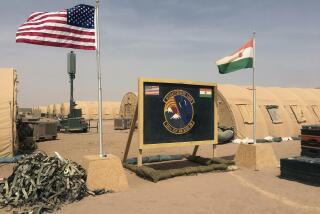Iraqi Army Takes Control of Najaf
- Share via
NAJAF, Iraq — U.S. troops withdrew from this holy city in southern Iraq on Tuesday, an initial step in the military’s effort to pull back from the country’s urban centers and turn over authority to Iraqi forces.
Under waving Iraqi flags, U.S. commanders formally turned over control of Forward Operating Base Hotel, a square, concrete-walled American base on the edge of Najaf, a shrine city about 100 miles south of Baghdad that saw intense fighting last year.
“The Iraqi army is operating successfully throughout the region,” said Lt. Col. James Oliver, the outgoing base commander, as he handed over the ceremonial keys to the base. “They are fully independent and capable of responding to all security needs. We are now here in a strictly advisory mode.”
Najaf’s hand-over scarcely could have been imagined last summer, when thousands of U.S. and Iraqi troops fought a pitched, three-week battle in the city against the militia forces of radical Shiite Muslim cleric Muqtada Sadr after the rebels seized control of several shrines. Hundreds died and much of the Old City was destroyed.
Calm was restored after followers of Grand Ayatollah Ali Sistani, Iraq’s leading Shiite cleric, marched on the city and brokered a resolution. Since then, violence has flared sporadically in Najaf -- just two weeks ago, six people were killed when clashes erupted between Sadr’s forces and another Shiite faction -- but commanders decided the situation had stabilized enough to warrant Tuesday morning’s transfer of authority.
The withdrawal is partially symbolic because U.S. forces will maintain a sizable force at Forward Operating Base Duke, a much larger facility about 20 miles away. But the move is an important psychological benchmark because the U.S. military presence in Iraq’s holiest city has long been a sore spot for Shiites in Iraq and around the world.
Najaf Police Chief Gen. Abbas Karim Moadel hailed the hand-over as “a historic moment” and a tribute to the growing capability of the Iraqi security forces.
The Hotel base, renamed Camp Karrar, is one of two dozen turned over to the Iraqi security forces so far, U.S. Army spokesman Lt. Col. Steve Boylan said.
Before the transfer ceremony, soldiers of the Shiite-dominated Iraqi battalion chanted, “We stand for Iraq!” and “Saddam is a coward!”
Despite Oliver’s statement that the U.S. remained only in an “advisory mode,” several Iraqi soldiers said they expected U.S. forces to continue regular patrols in Najaf. It “remains to be seen” whether U.S. patrols would continue, Boylan said.
Some Najaf residents expressed a hope that the American troops would stick around a while longer. A complete American withdrawal from Najaf could spark violent competition among different Shiite factions within the police and army, said Haidar Sayid Salman, owner of a stationery store in the Old City.
“I trust them to fight terrorism, but their loyalty is not to the government,” Salman said, referring to Iraqi security forces. “I wish we were ready for [independence], but we’re not.”
As the transfer of authority in Najaf proceeded Tuesday, violence was reported in the capital and restive Al Anbar province.
In Baghdad, two U.S. soldiers were killed and two others injured Tuesday morning when their vehicle hit a makeshift bomb and rolled over.
On Monday, a Marine assigned to the 2nd Marine Division in Al Anbar was killed by an improvised explosive during combat operations in Ramadi. Names of the dead were withheld pending family notification.
Fighting continued late Monday night near the Syrian border, where battles broke out last month between two rival tribes, one aligned with the Iraqi government and the other with insurgents led by Jordanian-born militant Abu Musab Zarqawi.
In a midnight attack, U.S. warplanes bombed two small bridges spanning the Euphrates River near Karabila. Military officials said insurgents used the bridges to move foreign fighters and equipment to central Iraq.
Marine F/A-18D jets damaged the bridges with concrete-filled bombs but did not destroy them, the military said.
In a related raid, U.S. troops attacked a nearby safe house that they said was being used by foreign fighters.
Two suspected foreign fighters were killed and three were arrested, U.S. officials said. One coalition soldier was wounded by “friendly fire.”
More to Read
Sign up for Essential California
The most important California stories and recommendations in your inbox every morning.
You may occasionally receive promotional content from the Los Angeles Times.













